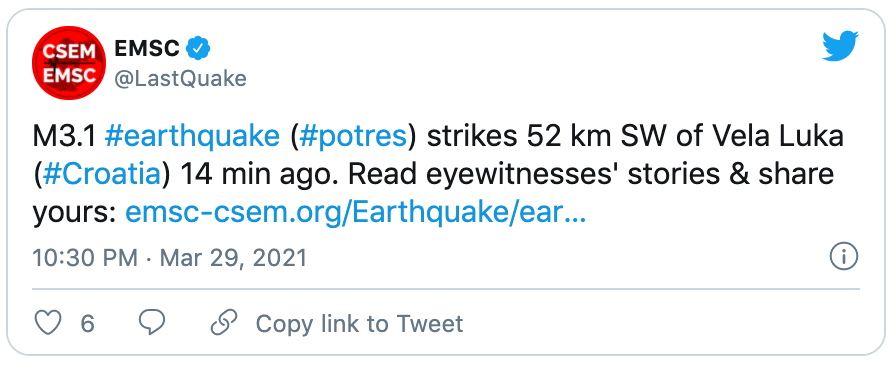March 30, 2021 - Nine earthquakes in the Adriatic Sea were recorded in the last 56 hours, felt by citizens from Split to Sinj.
24 Sata reports that on Monday, March 30, shortly after 10 pm, residents in the wider Split area felt the ground shake. Rattled citizens reported that they felt an earthquake in Split, Kaštela, Glavice, and Sinj
The EMSC reported that the earthquake was 3.1-magnitude on the Richter scale and that the epicenter was 52 kilometers from Vela Luka. And just before it there was a 2.9-magnitude earthquake with an epicenter 30 kilometers from Komiža on Vis.

"There was a rumble, it shook briefly but strongly," said one witness. "It rumbled for 6-7 seconds and shook briefly," said another. "I was really scared, it shook good," read another. Split singer Marijan Ban even took to Twitter to confirm that he felt the quake, too.

The first report of the earthquake arrived at 10:20 pm from Kaštel Sućurac. It was the ninth earthquake in the Adriatic Sea in the last 56 hours, the EMSC reported.
A bit later, seismologists from the Seismological Service announced that at 22:17 they recorded an earthquake with an epicenter 3 km south-southeast of Maovici near Vrlika, meaning that the Split area was shaken by three earthquakes just a few minutes apart!

Over the last few days, several slightly stronger earthquakes have been recorded in the Adriatic Sea, in the waters nea Split. The strongest so far was 5.5-magnitude on the Richter scale.
None of these earthquakes have been strong enough to cause any damage.
The EMSC was established in 1975 on the European Seismological Commission's recommendation, given that the Euro-Mediterranean region showed potentially dangerous seismic activity. It is headquartered in Bruyères le Châtel, a municipality on the southern outskirts of Paris, and is a non-profit NGO.
EMSC uses a unique earthquake detection system thanks to the collaborative work from eyewitnesses and data collection from seismic institutes provided by 85 institutes as members from 56 different countries, thus giving users real-time earthquake information for seismic events.
To read more about news in Croatia, follow TCN's dedicated page.


